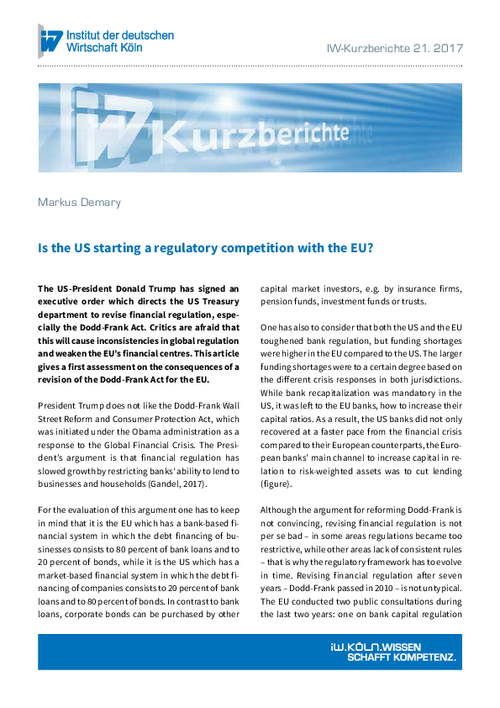The US-President Donald Trump has signed an executive order which directs the US Treasury department to revise financial regulation, especially the Dodd-Frank Act. Critics are afraid that this will cause inconsistencies in global regulation and weaken the EU’s financial centres. This article gives a first assessment on the consequences of a revision of the Dodd-Frank Act for the EU.

Is the US starting a regulatory competition with the EU?
IW-Kurzbericht

The US-President Donald Trump has signed an executive order which directs the US Treasury department to revise financial regulation, especially the Dodd-Frank Act. Critics are afraid that this will cause inconsistencies in global regulation and weaken the EU’s financial centres. This article gives a first assessment on the consequences of a revision of the Dodd-Frank Act for the EU.
President Trump does not like the Dodd-Frank Wall Street Reform and Consumer Protection Act, which was initiated under the Obama administration as a response to the Global Financial Crisis. The President’s argument is that financial regulation has slowed growth by restricting banks' ability to lend to businesses and households (Gandel, 2017).
For the evaluation of this argument one has to keep in mind that it is the EU which has a bank-based financial system in which the debt financing of businesses consists to 80 percent of bank loans and to 20 percent of bonds, while it is the US which has a market-based financial system in which the debt financing of companies consists to 20 percent of bank loans and to 80 percent of bonds. In contrast to bank loans, corporate bonds can be purchased by other capital market investors, e.g. by insurance firms, pension funds, investment funds or trusts.
One has also to consider that both the US and the EU toughened bank regulation, but funding shortages were higher in the EU compared to the US. The larger funding shortages were to a certain degree based on the different crisis responses in both jurisdictions. While bank recapitalization was mandatory in the US, it was left to the EU banks, how to increase their capital ratios. As a result, the US banks did not only recovered at a faster pace from the financial crisis compared to their European counterparts, the European banks’ main channel to increase capital in relation to risk-weighted assets was to cut lending (figure).
Although the argument for reforming Dodd-Frank is not convincing, revising financial regulation is not per se bad – in some areas regulations became too restrictive, while other areas lack of consistent rules – that is why the regulatory framework has to evolve in time. Revising financial regulation after seven years – Dodd-Frank passed in 2010 – is not untypical. The EU conducted two public consultations during the last two years: one on bank capital regulation and one on the establishment of a Capital Markets Union. And the EU was similar to Trump concerned over funding shortages for businesses and infrastructure investments. If the EU’s approach to financial regulation and the US approach will significantly deviate, financial regulation will become inconsistent at the global level.
The President’s executive order defines core principles for the regulation of the US financial system (White House, 2017a):
- Empower households to make independent and informed financial decisions, save for retirements, and build individual wealth.
- Prevent bank bailouts funded with public money.
- Foster economic growth and vibrant financial markets though more rigorous regulatory impact analysis.
- Enable domestic companies to be competitive with foreign firms in domestic and foreign markets.
- Advance American interests in international financial regulatory negotiations and meetings.
- Restore public accountability within Federal financial regulatory agencies.
The Secretary of the Treasury should after a consultation with the regulatory authorities report to the President, to what extent existing regulations promote the core principles, or hinder them (White House, 2017a).
While it is hard to predict what exact recommendations the Secretary of the Treasury will give, it can be discussed to what extent inconsistencies at the level of global financial regulation can be expected.
The first principle addresses consumer protection which was strengthened after the Global Financial Crisis, e.g. through the establishment of the Consumer Financial Protection Bureau which should guard against abusive or misleading retail financial products. Also the fiduciary rule is under review (White House, 2017b). This rule requires advisors on retirement accounts to work in the best interest of their clients. Weakening consumer protection might have primarily domestic consequences. But it should not be neglected that the root cause of the Global Financial Crisis was a domestic real estate bubble.
The second principle is in line with the international consensus of preventing bailouts to failing banks. But this principle does not rule out that the rules designed to achieve a better resolvability for large banks, which were too complex to resolve in the past, will not be lightened. And it also does not rule out the abatement of the Volcker rule, which restricts banks’ proprietary trading and excessive risk-taking.
The third principle addresses systemic risks. If the President will regard risks as large or small depends a lot on the design of the impact analysis and it will give room for discussion. In principle, deregulation could lead to a deviation of the US from global rules and standards on which regulators agreed in international forums like the Financial Stability Board (FSB), the Basel Committee on Bank Supervision (BCBS) or the International Organization of Securities Commissions (IOSCO).
That Trump wants the American companies to be competitive with foreign firms could mean that he wants to get rid of regulations which make it hard for small and mid-sized companies to get financing. But it could also mean, that he wants foreign firms’ access to American banks restricted, e.g. through higher risk-weights in bank capital regulation.
That Trump wants American interests in international financial regulatory negotiations and meetings to be advanced smells at lot like protectionism. It would probably mean that the US takes a different view in international forums. If the US wants to lessen standards, barriers to cross-border capital mobility will arise. The question here is also whether the US wants to protect US firms from foreign investors.
Restoring public accountability within Federal financial regulatory agencies can be interpreted as limiting the Federal Reserve Banks’ role in international forums. Trump has criticized the Fed’s participation before (Hamilton/Bain, 2017). Since Fed-chair Janet Yellen has the sole responsibility for monetary policy as well as for financial supervision and since her appointment has to be renewed next year, there might be a chance for Trump to replace her with someone who shares more his views on financial regulation.
The problem for the EU with this will be that the two countries with the most important global financial centres, London and New York, could start a regulatory competition with the EU’s financial centres in order to attract businesses. But the EU’s response to this competition should not be to lessen its standards, but to promote its own financial centres in continental Europe, especially in its competencies in financial technology.

Markus Demary: Is the US starting a regulatory competition with the EU?
IW-Kurzbericht

More on the topic

The Energy Dependence of Bank Loans
Russia's war against Ukraine has highlighted the vulnerability of the Federal Republic of Germany to Russian energy imports, especially natural gas.
IW
This time is different but still risky: Banking crisis instead of financial crisis
The current crisis of some American and European banks inevitably triggers fears that an international banking crisis could lead to a new financial crisis. But things in 2023 are very different from those in 2007.
IW